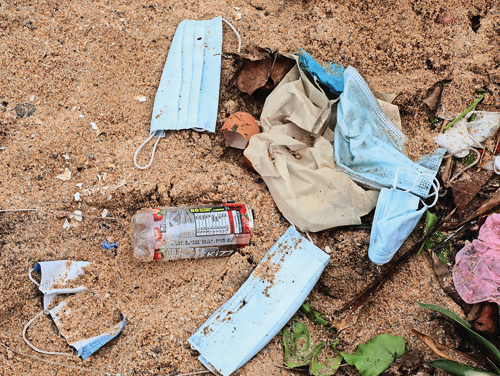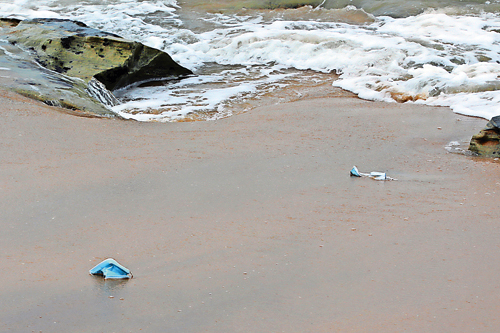News
COVID protector turns marine killer

Single-use surgical masks are invading our beaches and threatening the country’s marine population due to reckless disposal of the masks. Pix by M.A. Pushpakumara
While saving human lives from COVID-19, single-use surgical masks are invading our beaches and threatening the country’s marine population due to reckless disposal of the masks, experts fear.
Marine Environment Protection Authority (MEPA) Director-General P. B. Terney Pradeep Kumara said discarded masks have been seen in numbers along the western and southern coastal belts, especially in areas such as Wellawatte and Crow Island, where rivers and canals meet the sea.
“We are discussing methodology to conduct research on masks washing onto the shore and will be seeking help from district coastal offices for the research,” Dr. Pradeep Kumara said.
“Discussions will be held with health and environmental authorities on action to be taken. The face masks that lie along the beaches are not from deep-sea disposal but ones thrown onto the beach locally or washed up there from canals. The public needs to be instructed on the proper disposal of used masks,” he said.
Local research showed an adult uses about three to four masks a week.
“This means millions of masks are disposed of on a daily basis,” the MEPA chief said.
“The pandemic has led us to heavily depend on single-use plastic. Unless they are properly disposed of, these masks will end mainly in garbage dumps or in canals,” he added.
“People who are healthy or asymptomatic should not assume that these masks are harmless to health but actually consider them as clinical waste. Most masks contain microplastics so they need to be discarded in a separate bag with plastics,” Dr. Pradeep Kumara said.
Adverse effects on marine life from personal protective equipment (PPE) debris are being studied around the world, said Dr. H.B. Jayasiri, a senior lecturer and the Head of the Department of Coastal and Marine Resources Management at Sri Lanka’s Ocean University.
“Careless disposal of such items not only causes a threat to marine life, from corals to fish, but is also harmful to humans as microplastics can enter the human body via consumption of fish,” he said.
Dr. Jayasiri said people must be made aware of the need for safe mask disposal. He urged consideration of reusable masks that can be disinfected.
“Our southern breaches are rich in biodiversity. These discarded face masks, disinfectant wipes and even disposable gloves can have a major impact on our coral reefs,” he said.

Adverse effects on marine life from personal protective equipment (PPE) debris are being studied around the world
“The western coast is already threatened by discarded packaging material, fish buoys, styrofoam boxes and other litter. The government should address the face mask debris threat without delay,” Dr. Jayasiri said.
In an attempt to regularise hand sanitisers flooding the market, earlier this month, the Consumer Affairs Authority (CAA) issued an extraordinary gazette prohibiting the importing, manufacturing, storing, and distribution or displaying for sale of any hand sanitiser unless it is registered with the National Medicines Regulatory Authority (NMRA).
“Bottles of hand sanitisers are widely used by individuals and institutions and they range from pocket sized to larger bottles and disposal of these bottles will be a health and environmental concern if not done properly,” Dr. Jasinghe said.

